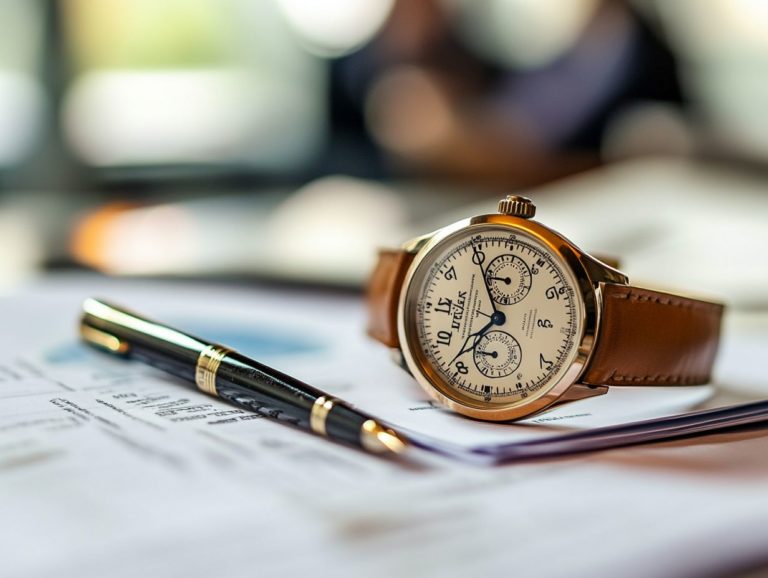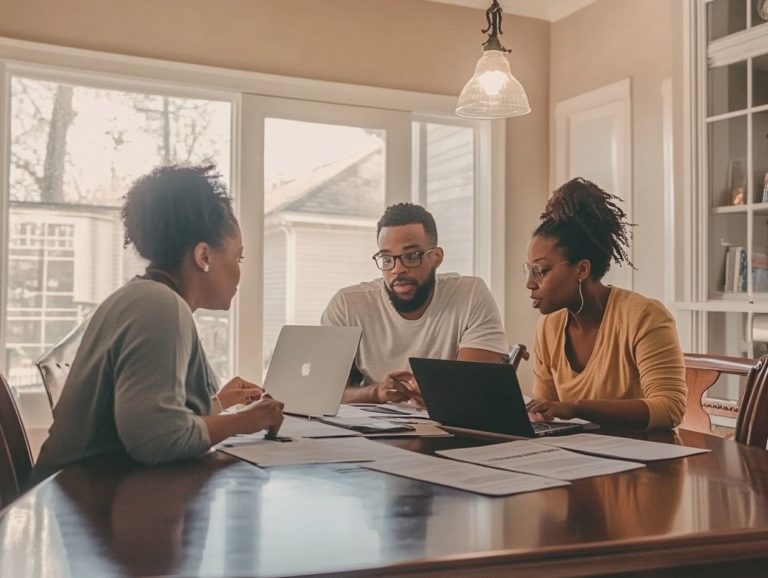Mastering the Follow-Up: An Essential Negotiation
In the realm of negotiations, the follow-up can truly be the deciding factor between success and failure. It s not merely about sealing the deal; it s about cultivating relationships and ensuring that everyone involved feels appreciated and valued.
This exploration reveals the pivotal role follow-ups play in negotiations, offering insights into preparation, effective communication, and strategies designed to pave the way for success.
Whether you re encountering resistance or working to revive a missed opportunity, the right approach has the potential to transform outcomes. Join us to discover essential tips that can change your negotiation game!
Contents
- Key Takeaways:
- The Importance of Follow-Up in Negotiations
- Preparing for a Follow-Up
- Effective Communication in a Follow-Up
- Strategies for a Successful Follow-Up
- Handling Difficult Situations in a Follow-Up
- Following Up After a Failed Negotiation
- Measuring Success of a Follow-Up
- Frequently Asked Questions
- What is the importance of mastering the follow-up in negotiations?
- How can mastering the follow-up improve the outcome of a negotiation?
- What are some effective ways to follow up after a negotiation?
- Is it necessary to follow up after every negotiation?
- How soon should I follow up after a negotiation?
- What are some common mistakes to avoid when following up after a negotiation?
Key Takeaways:
- Proper follow-up builds trust.
- Effective communication is crucial.
- A good follow-up can salvage a failed negotiation.

The Importance of Follow-Up in Negotiations
Follow-up is key in negotiations. It helps drive the process toward success.
A thoughtfully executed follow-up showcases your emotional intelligence and cultural awareness, allowing you to cultivate relationships and enhance your communication skills.
By implementing effective follow-up strategies, you can significantly elevate your negotiation tactics and convey your dedication to the process, paving the way for win-win solutions.
Why Follow-Up is Essential for Successful Negotiations
Follow-up is crucial for successful negotiations, as it reinforces commitments and strengthens trust between you and the other parties involved.
Once negotiations wrap up, following up serves not just as a reminder of the agreements but also as a chance for continued dialogue. Ongoing communication can clarify misunderstandings and show your commitment to openness.
By actively engaging after the initial discussions, you cultivate a sense of reliability essential for nurturing long-term relationships. Incorporating effective negotiation strategies during your follow-ups can lead to significant outcomes, ensuring that everyone feels heard and valued.
This approach boosts the likelihood of reaching mutually beneficial agreements and fosters deeper confidence in the negotiation process itself.
Preparing for a Follow-Up
Prepare carefully. Gather all the information you need to ensure you’re well-informed and set clear goals that align with the negotiation process.
This level of preparation not only enhances your position but also demonstrates your commitment and professionalism.
Gathering Information and Setting Goals
Gathering information and setting goals are essential steps in your follow-up process that can truly shape your future negotiations.
Consider effective strategies like conducting surveys or interviews to collect qualitative data. Also, leverage analytical tools to uncover trends from quantitative metrics.
Using resources like market research reports and competitor analyses can offer invaluable insights into the successes of others, helping you benchmark your own efforts effectively.
Establishing clear and measurable objectives like specific revenue targets or desired outcomes creates a focused framework to guide your discussions.
By applying data-driven strategies throughout your negotiation process, you can pave the way for improved results and cultivate more productive exchanges.
Effective Communication in a Follow-Up

Effective communication in a follow-up is essential. It involves negotiation tactics like active listening and showing genuine empathy, which fosters productive dialogue.
Active listening means really paying attention to what others say. Empathy is understanding their feelings.
Tips for Clear and Productive Communication
To achieve clear and productive communication during your follow-ups, it s essential to employ key negotiation skills and techniques that foster understanding and collaboration.
This means not only speaking clearly and concisely but also embracing active listening skills that enable genuine engagement.
By focusing on the speaker and asking clarifying questions, you can ensure that you grasp the nuances of the conversation.
Utilizing negotiation techniques such as summarizing points and identifying common interests can bridge gaps and facilitate constructive dialogues.
Practical steps such as maintaining eye contact and using open body language will enhance your communication process.
Ultimately, enhancing clarity in your discussions can lead to stronger partnerships and more effective outcomes.
Strategies for a Successful Follow-Up
Implementing effective strategies for a successful follow-up requires you to employ negotiation tactics that highlight your flexibility and adaptability in addressing the needs of everyone involved.
By focusing on these key elements, you can foster collaboration and ensure that all parties feel valued and heard.
Negotiation Tactics to Use in a Follow-Up
Employing effective negotiation tactics during follow-ups can lead you to win-win solutions while strengthening your negotiating relationships, especially by understanding your alternatives.
Building on this foundation, techniques such as making a small initial request and starting with a larger request can be particularly advantageous.
The small initial request approach involves making a request that s easy for the other party to accept, which subsequently opens the door for a larger request later on.
On the flip side, starting with a larger request that s likely to be turned down, followed by a more reasonable one, makes the latter seem much more appealing by comparison.
Utilizing these tactics not only boosts your chances of successful outcomes but also cultivates an atmosphere of collaboration and mutual respect, ensuring both parties feel valued and understood.
Handling Difficult Situations in a Follow-Up
Navigating challenging situations during a follow-up demands mastery of problem-solving skills and an understanding of the challenges in negotiations, including resistance and conflict.
When you tackle these challenges head-on, you improve your communication and foster more productive interactions.
Dealing with Resistance and Conflict

Dealing with resistance and conflict in follow-ups requires a strategic approach that employs negotiation tactics infused with emotional intelligence, which is essential for building trust effectively.
In such situations, it s crucial to appreciate the power of empathetic listening and self-awareness during your interactions.
When addressing concerns or disagreements, sharpening your ability to read emotional cues can significantly enhance communication.
Clarifying misunderstandings and validating feelings creates an atmosphere where everyone feels heard and respected.
By adopting collaborative problem-solving methods, you foster a sense of ownership among all participants, making it easier to arrive at mutually beneficial outcomes.
Weaving emotional intelligence into your conflict resolution strategies not only helps you overcome immediate challenges but also fortifies relationships for future collaborations.
Following Up After a Failed Negotiation
Don t wait following up after a failed negotiation is crucial for growth in your negotiation skills and for mending any relationships that may have been tested during the process.
Steps to Salvage a Failed Negotiation
To salvage a failed negotiation, use clear follow-up plans that blend emotional understanding with strategic tactics.
Paying attention to feelings can turn things around in your ability to repair relationships. After the initial meeting, reflect on the interactions and identify any misalignments or misunderstandings.
A well-timed follow-up, whether via email or phone call, gives you the chance to address these concerns while showcasing your empathy. Express gratitude for the previous discussions and reinforce the value of collaboration.
By employing active listening and adjusting your responses based on the other party’s emotional cues, you can steer the negotiation back on track. This enhances outcomes for both sides.
Measuring Success of a Follow-Up
Measuring success after your follow-up is essential for evaluating negotiation outcomes. This process informs your understanding and guides your continuous learning, enhancing future negotiation experiences.
Indicators of a Successful Follow-Up
Indicators of a successful follow-up often manifest as improved negotiation results, enhanced collaboration, and stronger long-term relationships.
These signs reflect positive interactions and underscore the effectiveness of your communication strategies during negotiations.
For instance, maintaining open dialogue after your initial meeting paves the way for deeper understanding of each party’s needs and objectives. Timely follow-ups demonstrate your commitment and professionalism, fostering the trust essential for fruitful collaboration.
As you continue to engage, your ability to address potential conflicts and negotiate mutually beneficial agreements will strengthen, creating a solid foundation for ongoing partnerships.
Frequently Asked Questions

What is the importance of mastering the follow-up in negotiations?
Mastering the follow-up is essential in negotiations as it solidifies your position and builds a stronger relationship with the other party. It also allows you to clarify misunderstandings and address concerns from the initial negotiation.
How can mastering the follow-up improve the outcome of a negotiation?
Following up shows your commitment and professionalism, positively impacting the other party’s perception of you and your proposal. It also gives you the chance to address objections or counter-offers from the other party, potentially leading to a more favorable outcome.
What are some effective ways to follow up after a negotiation?
One effective way to follow up is to send a thank-you email or letter, expressing appreciation for their time and reiterating your key points. Another way is to schedule a follow-up meeting or call to further discuss the negotiation and address any outstanding issues.
Is it necessary to follow up after every negotiation?
While following up is generally good practice, it may not always be necessary. If the negotiation resulted in a clear, mutually beneficial agreement, a follow-up may not be needed. However, if unresolved issues remain, a follow-up helps ensure everything is addressed.
How soon should I follow up after a negotiation?
The timing of your follow-up can vary, but it is best to follow up within 24-48 hours to keep the momentum going!
What are some common mistakes to avoid when following up after a negotiation?
Common mistakes include being too pushy or aggressive, not following up at all, and not being prepared with necessary information. Avoid being too casual or unprofessional in your communication.






